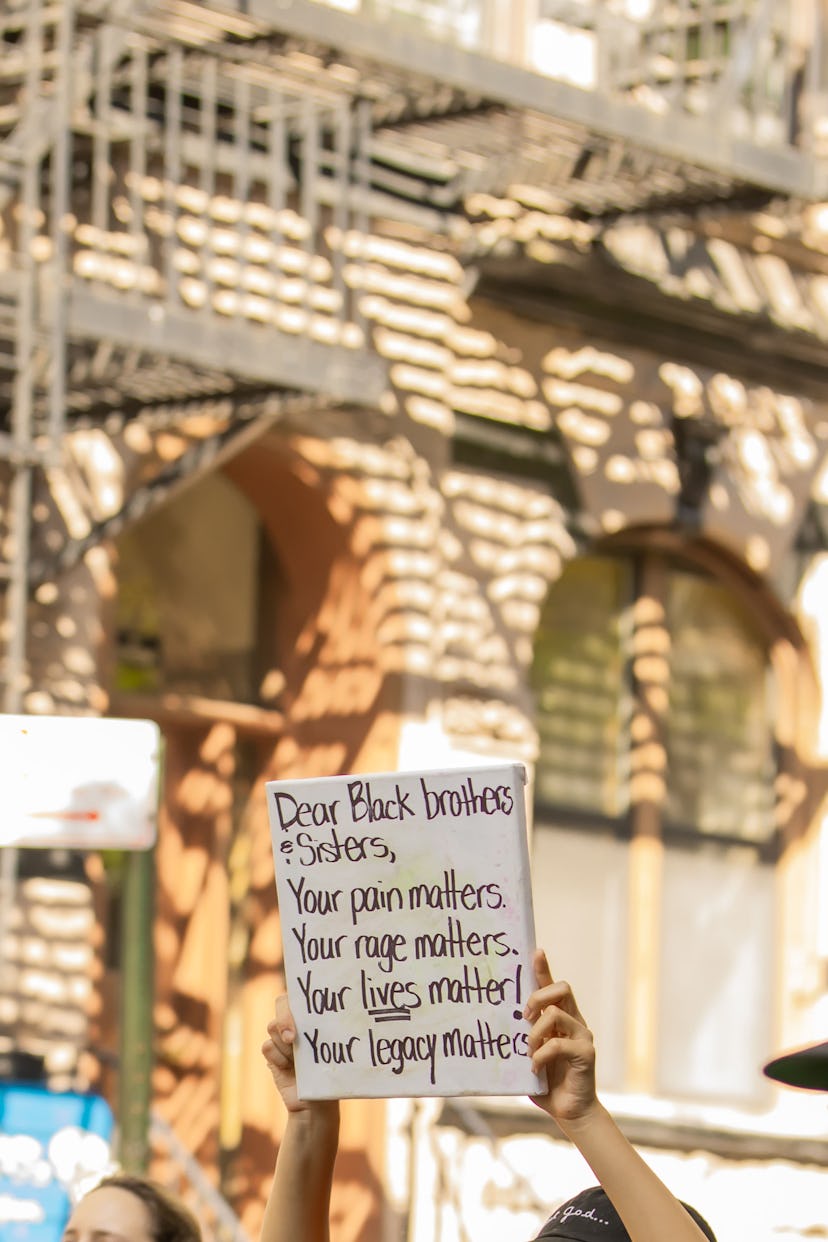Read & Resist: W’s Daily Briefing for June 26
From the racial reckonings happening in media to Pride’s return to its radical roots, here are the stories not to miss.

Back in the day, W started off the morning with a quick round-up of links to that day’s fashion- and culture-related news. Times have changed; in the weeks since a now former white police officer named Derek Chauvin killed an unarmed Black man named George Floyd, protests have erupted across the country. Now, more than ever, it’s important to stay up to date, which is why we’re reviving “Chic in Review” as the slightly more radical “Read & Resist.” Here are the stories, videos, and tweets we’re hoping you don’t miss this Friday:
“How the Police Could Be Defunded,” by Alexis Okeweo for the New Yorker
Over the past three years, crisis-management-system (CMS) workers have reduced the number of shootings in 17 of Brooklyn’s precincts with the highest levels of violence by 15 percent. Thanks to community workers, Alexis Okeweo writes, an alternative vision of safety is indeed possible—and that’s just one of his examples.
“You Want a Confederate Monument? My Body Is a Confederate Monument,” by Caroline Randall Williams for the New York Times
To give you an idea of how stunningly powerful this essay by the poet Caroline Randall Williams is, here’s the opening line: “I have rape-colored skin.”
“A Florida Cop Killed Tony McDade. Now He’s Hiding Behind a Law Meant to Protect Victims,” by Laura Thompson for Mother Jones
Two days after the police killing of George Floyd, an officer in Tallahassee killed a Black transgender man named Tony McDade. Thanks to the Black Lives Matter movement, there’s a good chance you know McDade’s name. The officer’s name, on the other hand, remains a mystery. And it may forever be one, thanks to his classification as a “victim” under Florida law.
“On Performing Gratitude,” by Prachi Gupta for Jezebel
“I never planned on telling this story publicly,” Prachi Gupta begins this essay on how Black and brown writers such as herself have been exposing the racism of media workplaces, many of which claim to have built their brands on inclusivity. “I’ve been thinking a lot about gratitude—mainly, how Black and brown people are expected to feel it and express it in white spaces; about how I often did—and still reflexively do,” Gupta writes. “Looking back at my own experiences, I was valued to the extent that I helped make white institutions appear more diverse, yet the perspectives I brought were devalued: they were often sidelined as either ‘niche’ or too controversial because they did not support the dominant narratives of white managers or editors. I was welcome so long as I didn’t demand much, and so long as I continued to demonstrate how thankful I was to be there.”
“Inside the Toxic Workplace at Groundbreaking Latinx Culture Site Remezcla,” by Emily Alford for Jezebel
Since the launch of Remezcla in 2006, the website’s success has been largely credited to a single man, lauded as a visionary for uplifting the voices of Latinx women. But according to a dozen former Remezcla employees who spoke with Emily Alford, Andrew Herrera not only left the work to an unacknowledged, primarily female staff; he also traumatized them.
“Five Ideas to Make Silicon Valley Less Racist,” by Will Oremus for OneZero
Silicon Valley wields a disturbing amount of power over society—and it’s no coincidence that the technologies developed by its mostly white and Asian workforce disproportionately harm people who are Black. But an anti-racist future is still possible for Silicon Valley, according to five leading Black industry figures. Leslie Miley, Y-Vonne Hutchinson, Meredith Broussard, Safiya Noble, and Chris Gilliard offer a road map, with an emphasis on abolishing facial recognition.
“Pride Should Always Look the Way It Does This Year,” by Christina Cauterucci for Slate
There is no celebrating Pride Month as usual during a pandemic. But, as Christina Cauterucci writes, that’s a good thing: With corporate Pride groups out of the way, alternative ones can finally return Pride to its “provocative, furious, chaotic but targeted, unconcerned with respectability politics, focused on the needs of the most marginalized” roots.
“‘Russell Simmons Raped Me.’ Will Black Women Always Be an Afterthought?,” by Alexia Norton Jones for the Daily Beast
Beginning with the enduring relevance of Malcolm X’s 1962 assertion that the Black woman is the most “disrespected,” “unprotected,” and “neglected” person in America, Alexia Norton Jones explores the historical context of why she and a dozen more women who’ve alleged rape and brutal sexual assault by Russell Simmons have yet to be taken seriously.
“Solidarity at Sea,” by Emilia Petrarca for The Cut
Dozens of Black surfers have shown solidarity for the movement against systemic racism and police brutality by partaking in “paddle-outs” at Rockaway Beach. “The ocean may seem like a far-off place to make a statement about police brutality,” Emilia Petrarca writes, “but systemic racism has historically reached beyond the shore.”
Newsreel
Food for Thought
Related: 21 Queer BIPOC Photographers Illustrate What “Pride” Really Means